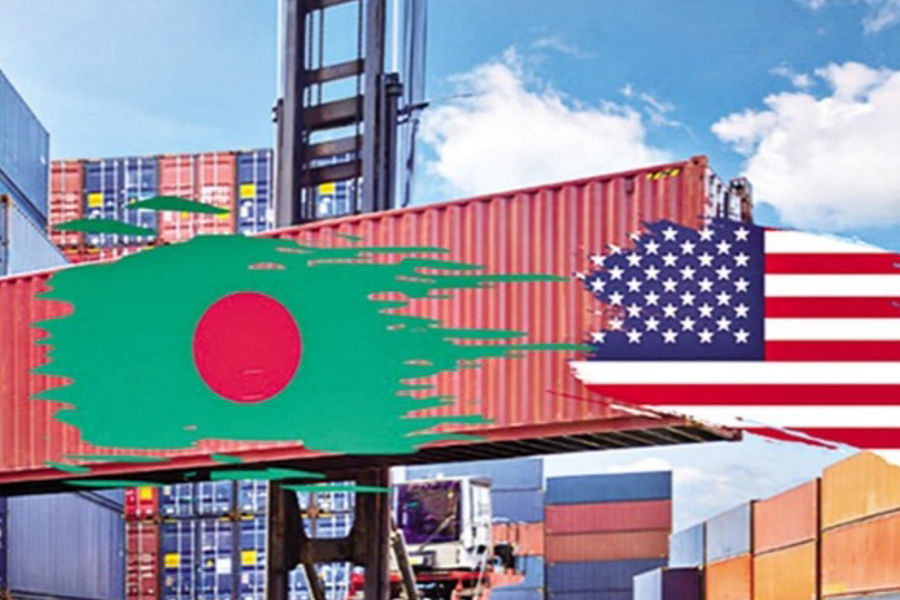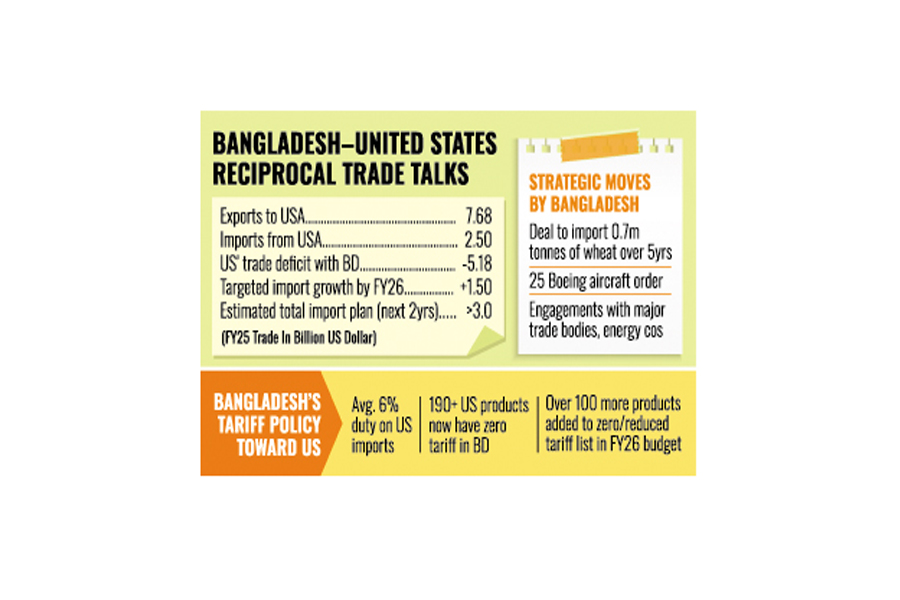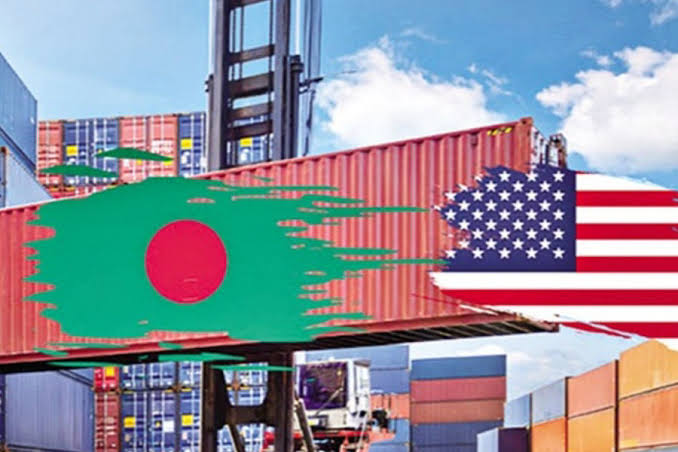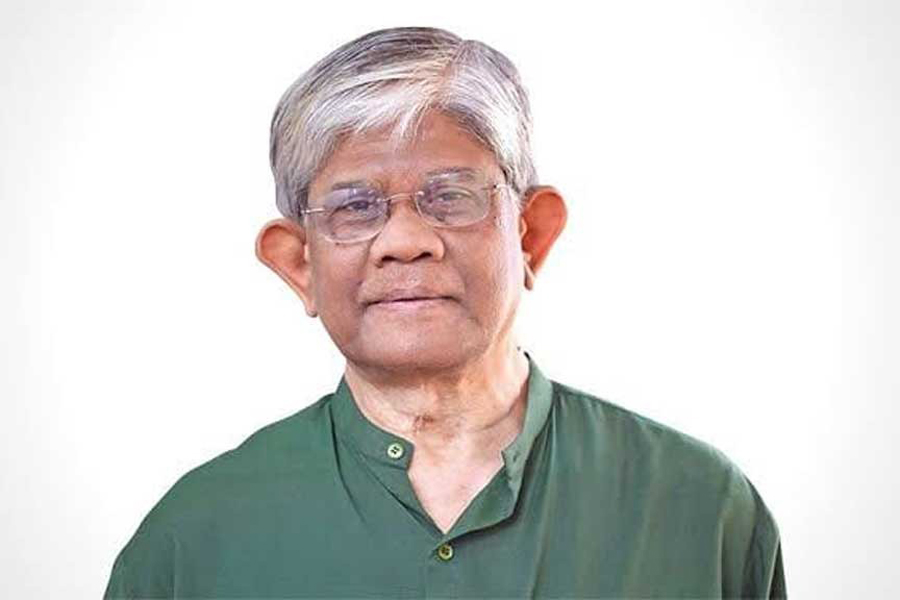Saif
Senior Member
- Joined
- Jan 24, 2024
- Messages
- 16,529
- Likes
- 8,140
- Nation

- Residence

- Axis Group


What's in store for US-BD final round of tariff talks?
A Bangladesh trade mission, as reported, is scheduled to meet for the third time with the Office of the United States Trade Representative (USTR) in Washington, D.C., on July 29 and July 30 to see if the 35 per cent reciprocal tariff that the Trump administration has imposed on Bangladesh's exports
What's in store for US-BD final round of tariff talks?
SYED FATTAHUL ALIM
Published :
Jul 29, 2025 00:17
Updated :
Jul 29, 2025 00:17

A Bangladesh trade mission, as reported, is scheduled to meet for the third time with the Office of the United States Trade Representative (USTR) in Washington, D.C., on July 29 and July 30 to see if the 35 per cent reciprocal tariff that the Trump administration has imposed on Bangladesh's exports to the US market could be lowered. There is the possibility of holding yet another round of meeting with the USTR on July 31.The US reciprocal tariff rate is set to take effect on August1. So, it is going to be a hectic last minute effort on the part of the Bangladesh trade delegation led by Commerce Adviser along with the National Security Adviser and comprising the commerce secretary and additional commerce secretary as its members. Notably, Bangladesh trade team has, meanwhile, finished two rounds of talks with the USTR following US president Donald Trump's July 8 letter to Bangladesh's Chief Adviser Dr Muhammad Yunus about the imposition of reciprocal tariff at the rate of 37 per cent on Bangladeshi exports to America. With no further reassurance from the USTR during those two rounds of trade talks, except for an exemption of just 2 per cent from original reciprocal tariff so imposed, Bangladesh is trying its luck for the third time. Best of luck! But when added to the currently existing duty at 15per cent on the entry of Bangladesh-origin products, especially Readymade Garment (RMG), into the US market, the total tariff will come to 50 per cent after August 1.
In response, Bangladesh sent its position paper on July 22 and proposed starting next and final rounds of tariff talks on July 26. However, USTR fixed July 29 as the next date for the resumption of talks. It is further reported that the government is going to purchase 25 more Boeing aircraft to add to Biman's existing fleet. But the Boeing purchase is purely a company level deal between Boeing and Biman, and not part of the intergovernmental tariff negotiations, the commerce secretary is learnt to have explained at a Press briefing. But why then Bangladesh will go for this very costly purchase of so many Boeing-made US passenger planes, since the list price of each of these different models of aircraft range from USD 217.9 million to USD 375.5 million. And that too is taking place at a time when Bangladesh's forex reserves, though now on a better footing than before, have yet to reach a comfortable level to afford such a big purchase deal. Hopefully, during actual purchase or leasing, the list prices may come down substantially due to the commissions offered by the selling company depending on market conditions, bulk purchase and so on. That the purchases will take years to materialise is also a consideration to note. Even so, it is still a challenging move that the government is making just to mollify a difficult trading partner despite what has been said to clarify the intent of the plane purchase deal. True, there was already a purchase order for 14 Boeing planes during the past government and that the present numerical strength of Biman fleet needs improvement.
But what matters here is if there is real urgency of such purchase deals. What will, for instance, the corruption-ridden public limited company, Biman, do with those additional planes when its main problems are poor management and outdated operational procedures? Is it then surprising that Biman is lagging behind its regional competitors in terms of service quality as well as business performance? It is to be noted that Bangladesh has already offered zero per cent duty facilities on imports of US-origin products including wheat, LNG, etc. That India, Vietnam and Indonesia are buying large numbers of Boeing aircraft from America and getting considerable tariff exemptions from the USTR does not necessarily mean that Bangladesh would win similar favour from the US just by plane purchase when geopolitics is also a factor. It is purely experience, efficiency and keen business acumen that matter in clinching a good business deal, not just goodwill.
SYED FATTAHUL ALIM
Published :
Jul 29, 2025 00:17
Updated :
Jul 29, 2025 00:17
A Bangladesh trade mission, as reported, is scheduled to meet for the third time with the Office of the United States Trade Representative (USTR) in Washington, D.C., on July 29 and July 30 to see if the 35 per cent reciprocal tariff that the Trump administration has imposed on Bangladesh's exports to the US market could be lowered. There is the possibility of holding yet another round of meeting with the USTR on July 31.The US reciprocal tariff rate is set to take effect on August1. So, it is going to be a hectic last minute effort on the part of the Bangladesh trade delegation led by Commerce Adviser along with the National Security Adviser and comprising the commerce secretary and additional commerce secretary as its members. Notably, Bangladesh trade team has, meanwhile, finished two rounds of talks with the USTR following US president Donald Trump's July 8 letter to Bangladesh's Chief Adviser Dr Muhammad Yunus about the imposition of reciprocal tariff at the rate of 37 per cent on Bangladeshi exports to America. With no further reassurance from the USTR during those two rounds of trade talks, except for an exemption of just 2 per cent from original reciprocal tariff so imposed, Bangladesh is trying its luck for the third time. Best of luck! But when added to the currently existing duty at 15per cent on the entry of Bangladesh-origin products, especially Readymade Garment (RMG), into the US market, the total tariff will come to 50 per cent after August 1.
In response, Bangladesh sent its position paper on July 22 and proposed starting next and final rounds of tariff talks on July 26. However, USTR fixed July 29 as the next date for the resumption of talks. It is further reported that the government is going to purchase 25 more Boeing aircraft to add to Biman's existing fleet. But the Boeing purchase is purely a company level deal between Boeing and Biman, and not part of the intergovernmental tariff negotiations, the commerce secretary is learnt to have explained at a Press briefing. But why then Bangladesh will go for this very costly purchase of so many Boeing-made US passenger planes, since the list price of each of these different models of aircraft range from USD 217.9 million to USD 375.5 million. And that too is taking place at a time when Bangladesh's forex reserves, though now on a better footing than before, have yet to reach a comfortable level to afford such a big purchase deal. Hopefully, during actual purchase or leasing, the list prices may come down substantially due to the commissions offered by the selling company depending on market conditions, bulk purchase and so on. That the purchases will take years to materialise is also a consideration to note. Even so, it is still a challenging move that the government is making just to mollify a difficult trading partner despite what has been said to clarify the intent of the plane purchase deal. True, there was already a purchase order for 14 Boeing planes during the past government and that the present numerical strength of Biman fleet needs improvement.
But what matters here is if there is real urgency of such purchase deals. What will, for instance, the corruption-ridden public limited company, Biman, do with those additional planes when its main problems are poor management and outdated operational procedures? Is it then surprising that Biman is lagging behind its regional competitors in terms of service quality as well as business performance? It is to be noted that Bangladesh has already offered zero per cent duty facilities on imports of US-origin products including wheat, LNG, etc. That India, Vietnam and Indonesia are buying large numbers of Boeing aircraft from America and getting considerable tariff exemptions from the USTR does not necessarily mean that Bangladesh would win similar favour from the US just by plane purchase when geopolitics is also a factor. It is purely experience, efficiency and keen business acumen that matter in clinching a good business deal, not just goodwill.





































